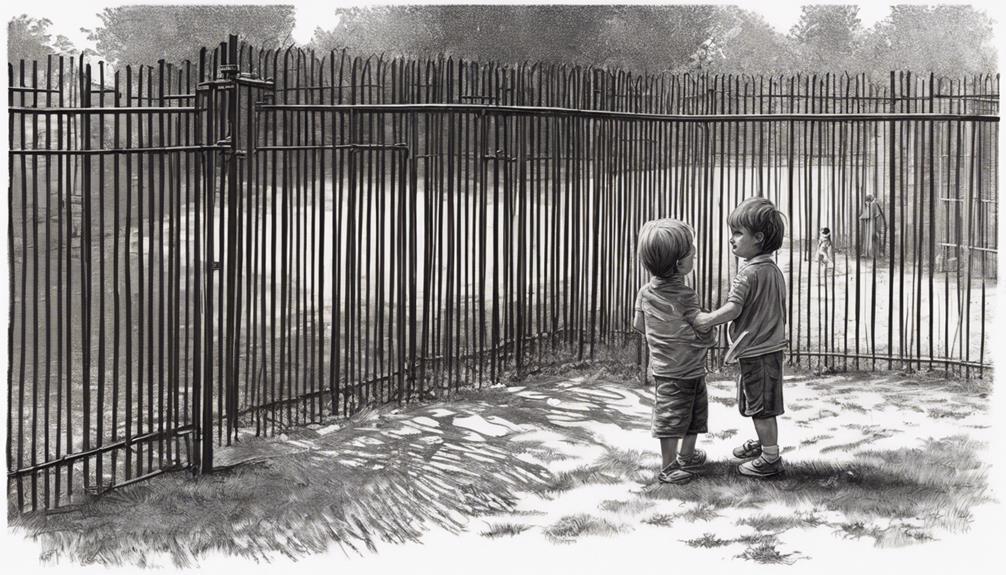When looking at how **divorce affects kids** in Arizona, it becomes clear that grasping the special obstacles they encounter is vital for their happiness. Dive into the **complexities** and help build a **brighter future** for these young ones!
The emotional toll, adjustment difficulties, and long-term effects can leave lasting impressions. By acknowledging these complexities and implementing appropriate support mechanisms, we can foster resilience in children navigating through the complexities of divorce.
A deeper look into the strategies and resources available can shed light on effective ways to address these challenges and ensure a smoother transition for the younger members of our communities.
Key Takeaways
- Children in Arizona experience emotional challenges like self-blame and guilt during divorce.
- Maintaining positive relationships with both parents is crucial for children's well-being post-divorce.
- Offering children therapy and creating a nurturing environment aids in coping with divorce.
- Open communication, consistent routines, and support networks help children navigate divorce challenges.
Impact of Divorce on Children
When parents decide to end their marriage, the impact of divorce on children can be profound and lasting. Children from divorced families often experience higher rates of depression and anxiety. The conflicts, whether verbal or non-verbal, between parents during this time can greatly affect how children cope and heal from the situation. It's essential for parents to be mindful of their actions and choices as they can significantly influence how well their children adjust to the divorce.
In many cases, children may feel a sense of responsibility for their parents' emotions post-divorce. It's crucial for parents to reassure their children that the divorce isn't their fault, as this reassurance plays a vital role in the emotional well-being of the children. By creating a supportive and understanding environment, parents can help their children navigate through this challenging period with more ease and stability.
Legal Considerations for Child Custody

Considering the legal landscape in Arizona, it's essential for divorcing parents to understand the nuanced factors that impact child custody decisions.
In Arizona, the court maintains a neutral stance initially, not favoring one parent over the other. Judges in Arizona prioritize the best interests of the children while considering parental willingness to facilitate the child's relationship with the other parent. Temporary arrangements are put in place during divorce proceedings to ensure the well-being of the children.
Both parents have legal rights to access their children post-divorce, emphasizing the importance of maintaining relationships with both parents. Problems in child custody arrangements can arise if a child's access to one parent is restricted.
It's crucial for parents to be aware of court considerations and to actively work towards facilitating positive relationships between the child and both parents throughout the divorce process. By understanding these legal considerations, parents can navigate child custody matters more effectively and prioritize their children's well-being during this challenging time.
Emotional Challenges for Children
Navigating the emotional challenges experienced by children during divorce can be a complex and sensitive journey for families in Arizona. Witnessing their parents' separation, children often grapple with a myriad of conflicting emotions that can be overwhelming.
Here are some key emotional challenges children may face during divorce:
- Self-Blame and Guilt: Children frequently internalize the divorce, feeling responsible for their parents' split, leading to low self-esteem and guilt.
- Loyalty Conflicts: Struggling to balance their loyalty between parents, children may feel torn and conflicted.
- Custody Arrangements: Adjusting to new custody schedules can be emotionally taxing, as children may fear abandonment or struggle with separation anxiety.
- Stepfamily Relationships: Building relationships with new stepfamily members can be challenging, as children navigate unfamiliar dynamics and roles within the blended family structure.
Understanding and addressing these emotional hurdles with empathy and support is crucial in helping children cope with the profound impact of divorce on their lives.
Support Systems for Children

As families navigate the emotional challenges of divorce in Arizona, establishing strong support systems for children is essential to help them cope and thrive during this difficult time. Children benefit greatly from therapy, counseling, and support groups, providing them with a safe space to express their feelings and process the changes happening around them.
It's crucial to create a stable environment for children, whether it's at home, school, or within their community, where they feel secure and nurtured by trusted adults. Encouraging open communication and emotional expression can help children navigate the complexities of divorce, fostering resilience and understanding.
Additionally, involving children in extracurricular activities and hobbies can offer them a positive outlet for their emotions and a sense of normalcy during this period of transition. Building a strong support network around children, consisting of reliable adults and understanding peers, can further reinforce their sense of belonging and provide them with the necessary tools to navigate the challenges ahead.
Coping Strategies for Children
Understanding and implementing effective coping strategies is crucial for children to navigate the challenges of divorce and emerge stronger from the experience.
Here are some key coping strategies that can help children in Arizona cope with the emotional challenges of divorce:
- Reassurance: Providing children with reassurance that the divorce isn't their fault can help alleviate feelings of guilt or responsibility.
- Open Communication: Encouraging open communication about their feelings allows children to process their emotions in a healthy way.
- Consistent Routines: Maintaining consistent routines and stability post-divorce can provide children with a sense of security and normalcy during a time of change.
- Therapy/Counseling: Offering access to therapy or counseling services can support children in dealing with the emotional challenges that come with divorce.
Frequently Asked Questions
At What Age Is a Child Most Affected by Divorce?
We believe children between 12-14 years old may be most affected by divorce, questioning relationships and identity. Adolescents, around 15-18 years old, may struggle with emotional distress and independence. Understanding these ages can guide support.
Who Loses More Financially in a Divorce?
We believe both parties can face financial challenges post-divorce, but statistically, women often experience a more significant income decrease. Seeking financial advice and planning can help mitigate these losses and support a smoother transition.
Who Is Better off Financially After Divorce?
We understand the concern about financial well-being after divorce. It's important to consider individual circumstances as financial outcomes vary. Planning, support, and understanding legal rights can help navigate post-divorce finances for a more stable future.
What Not to Say to Kids During Divorce?
During a divorce, we should avoid discussing legal or financial matters with children, speaking negatively about the other parent, using children as messengers, or sharing inappropriate details. It's crucial to prioritize their emotional well-being.
How Does Divorce Impact Children in Arizona Specifically?
In Arizona, the effects of divorce on children can be profound. Children may experience emotional distress, behavior changes, and academic struggles. They may also feel torn between parents and face uncertainty about their future. Seeking support and counseling can help minimize the impact and provide children with the tools to cope.
Conclusion
As we navigate the choppy waters of divorce in Arizona, let's remember the impact it has on our children. Like fragile ships in a storm, they need our steady guidance and support to weather the challenges ahead.
By setting aside our differences, seeking legal counsel, and providing love and stability, we can help them sail through these turbulent times and emerge stronger, resilient, and ready to embrace the calm waters of their future.










